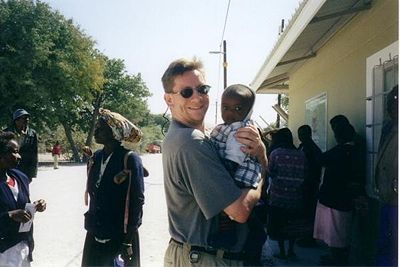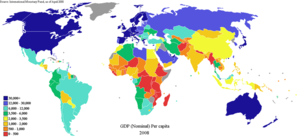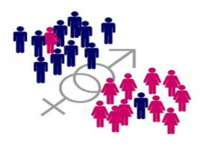Brian Hollar
From Santa Fe Institute Events Wiki

Brief Bio
Hi,
I am currently working on a joint PhD in Economics and JD (law degree) at George Mason University in Arlington, VA. My areas of concentration in economics are public choice (an economic analysis of politics), the economics of religion (similar to the sociology of religion, but using the tools of economic analysis), and ‘law and economics’. After seeing many impoverished areas of the world, I have a particular interest in how all of these factors affect economic development in the developing world. Within law, my areas of interest include intellectual property, technology law, and criminal law. My current research involves investigating the impact of gender imbalance (more women than men in a population or vice-versa) and information availability on marriage markets.
Prior to coming to GMU to study economics and law, I was a controls and project engineer working in the power industry. I have a degree in mechanical engineering from Virginia Tech and an MBA from the University of Florida.
Besides my work and studies, I love to travel. I’ve made it to 28 countries, 7 continents (including Antarctica), and 50 states so far. I enjoy kayaking (probably not too much of that in the desert), camping, reading, and road trips just about anywhere and everywhere.
I look forward to meeting everyone this summer. In the meantime, you can e-mail me at hollar@mindspring.com.
Answers to Dan's Questions

1. What are your main interests? Feel free to include a "pie in the sky" big idea!
I am very interested in learning more about how to integrate complex systems modeling and analysis into my research in both dynamic market behavior and the evolution of common law. In particular, I am interested in how to better model and understand the behavior of marriage markets, the evolution of common law and other social institutions, and economic development.
Like many economists, my biggest "pie in the sky" question is trying to understand why some nations are so rich and others are so poor. As Nobel laureate Robert Lucas once said: “Once you start thinking about this, it is hard to think about anything else.”
2. What sorts of expertise can you bring to the group?
I have years of industry experience, a broad exposure to many parts of the world, and a diverse academic and professional background. Academically, I bring a broad understanding of economics, business, technology, and the law. I also have some basic experience with agent-based models, numerical methods, and game theory.
3. What do you hope to get out of the CSSS?
I hope to have a chance to better model adaptive systems of heterogeneous actors engaged in dynamic, complex interactions. In particular, My goal is to learn how to model the behavior of people acting in marriage markets and economic exchange. I very much look forward to learning from and getting to know my fellow students and the faculty and staff of CSSS. I hope to develop some lifelong friendships out of the experience.
4. Do you have any possible projects in mind for the CSSS?

Here are a few possible ideas:
- The effects of gender-imbalances on marriage markets. Social groups which experience a gender imbalance in marriage markets include most religious groups, college campuses, some large cities (such as New York and Washington, DC), the African American community, and some nations (notably China). I am interested in how these gender imbalances affect social norms, marriage and divorce rates, and dating/matching behavior of these various groups.
- The endowment effect as evolutionary advantage. In the absence of property rights and a stable rule of law, an individual with some level of an endowment effect may provide an advantage for survival and reproduction over individuals with no endowment effect. This effect could act in a similar way to territoriality, allowing individuals to make credible threats when protecting their property in repeated interaction games.
- The impact of property rights allocation on the behavior of religious groups. Property ownership allocation in American religious groups differ by denomination. In some denominations, church property is owned by the national organization. In other denominations, each individual congregation owns their specific church. I am interested in researching how differences in property rights ownership affects the accountability and responsiveness of national religious organizations, with the expectation that those churches with denominationally owned properties tend towards higher levels of bureaucracy and less responsive leadership.
- An economic analysis on the effects of religious freedom laws have on religious diversity and religious attendance, and the effects of persecution on the persistence of religious groups. Economic theory predicts that where there is greater ability of religious groups to compete in the “religious marketplace” with one another, the greater diversity of religious groups should exist in that environment and higher levels of religious attendance should be observed. When religions undergo persecution (either at a political or social level), both the cost and the benefit of belonging to the group tends to increase. If the benefit of belonging increases more than the cost, persecution may cause a religion to grow and persist rather than decrease in size.



